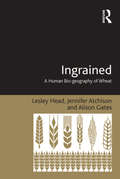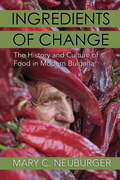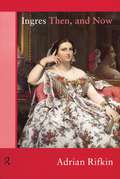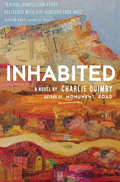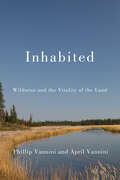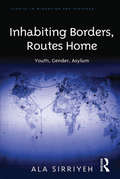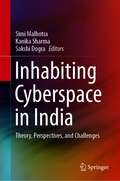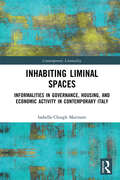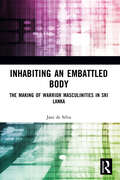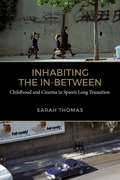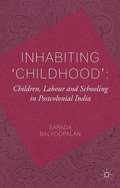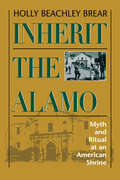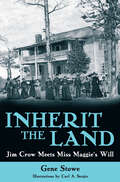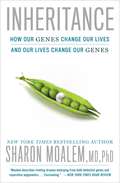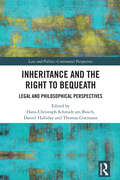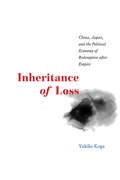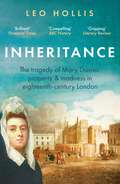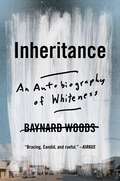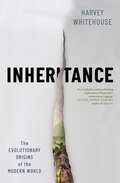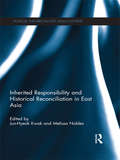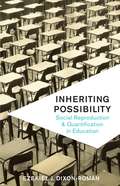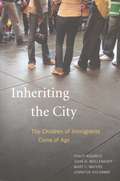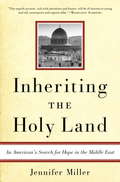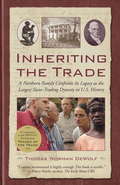- Table View
- List View
Ingrained: A Human Bio-geography of Wheat
by Lesley Head Jennifer AtchisonPlants are fundamental players in human lives, underpinning our food supply and contributing to the air we breathe, but they are easy to take for granted and have received insufficient attention in the social sciences. This book advances understanding of human-plant relations using the example of wheat. Theoretically, this book develops new insights by bringing together human geography, biogeography and archaeology to provide a long term perspective on human-wheat relations. Although the relational, more-than-human turn in the social sciences has seen a number of plant-related studies, these have not yet fully engaged with the question of what it means to be a plant. The book draws on diverse literatures to tackle this question, advancing thinking about how plants act in their worlds, and how we can better understand our shared worlds. Empirically, the book reports original ethnographic research on wheat production, processing and consumption in a context of globalisation, drought and climate change and traces the complex networks of wheat using a methodology of 'following' it and its people. The ethnobotanical study captures a number of moments in the life of Australian wheat; on the farm, at the supermarket, in the lives of coeliac sufferers, in laboratories and in industrial factories. This study demands new ways of thinking about wheat geographies, going beyond the rural landscape to urban and industrial frontiers, and being simultaneously local and global in perspective and connection.
Ingredients of Change: The History and Culture of Food in Modern Bulgaria
by Mary C. NeuburgerIngredients of Change explores modern Bulgaria's foodways from the Ottoman era to the present, outlining how Bulgarians domesticated and adapted diverse local, regional, and global foods and techniques, and how the nation's culinary topography has been continually reshaped by the imperial legacies of the Ottomans, Habsburgs, Russians, and Soviets, as well as by the ingenuity of its own people. Changes in Bulgarian cooking and cuisine, Mary C. Neuburger shows, were driven less by nationalism than by the circulation of powerful food narratives—scientific, religious, and ethical—along with peoples, goods, technologies, and politics. Ingredients of Change tells this complex story through thematic chapters focused on bread, meat, milk and yogurt, wine, and the foundational vegetables of Bulgarian cuisine—tomatoes and peppers. Neuburger traces the ways in which these ingredients were introduced and transformed in the Bulgarian diet over time, often in the context of Bulgaria's tumultuous political history. She shows how the country's modern dietary and culinary transformations accelerated under a communist dictatorship that had the resources and will to fundamentally reshape what and how people ate and drank.
Ingres Then, and Now (Re Visions Ser.)
by Adrian RifkinIngres Then, and Now is an innovative study of one of the best-known French artists of the nineteenth century, Jean Auguste Dominique Ingres. Adrian Rifkin re-evaluates Ingres' work in the context of a variety of literary, musical and visual cultures which are normally seen as alien to him. Re-viewing Ingres' paintings as a series of fragmentary symptoms of the commodity cultures of nineteenth-century Paris, Adrian Rifkin draws the artist away from his familiar association with the Academy and the Salon.Rifkin sets out to show how, by thinking of the historical archive as a form of the unconscious, we can renew our understanding of nineteenth-century conservative or academic cultures by reading them against their 'other'. He situates Ingres in the world of the Parisian Arcades, as represented by Walter Benjamin, and examines the effect of this juxtaposition on how we think of Benjamin himself, following Ingres' image in popular cultures of the twentieth century. Rifkin then returns to the late eighteenth and early nineteenth centuries to find traces of the emergence of bizarre symptoms in Ingres' early work, symptoms which open him to a variety of conflicting readings and appropriations. It concludes by examining his importance for the great French art critic Jean Cassou on the one hand, and in making a bold, contemporary gay appropriation on the other.Ingres Then, and Now transforms the popular image we have of Ingres. It argues that the figure of the artist is neither fixed in time or place - there is neither an essential man named Ingres, nor a singular body of his work - but is an effect of many, complex and overlapping historical effects.
Inhabited
by Charlie Quimby"Charlie Quimby is a writer with a big talent, big heart, and big social conscience. In his second novel, Inhabited, characters finely drawn and memorable live amidst the crisscrossing lines of moral conscience, political juggling and economic expediency, a tough neighborhood. I was staggered by the authenticity of these people and their dilemmas."-FAITH SULLIVAN, author of Goodnight, Mr. Wodehouse and The Cape Ann"Charlie Quimby is the sharpest shooter in the West. Inhabited is a dramatic, honest, humane portrait of a Colorado city in the throes of great change and great choice. The characters and the setting are indelibly rendered...We're all in the mix here-rich and poor, homeless and over-housed, rancher and eco-activist, native politician and outside scoundrel. Inhabited is a vivid, compelling story delivered with 21st-century true grit."-ALYSON HAGY, author of Boleto"A thoroughly enjoyable novel that masterfully takes the reader on an emotionally rewarding exploration of 'home' and the power the concept has on the human psyche."-JONATHAN ODELL, author of Miss Hazel and the Rosa Parks League"Inhabited transforms a typical community 'homeless problem' into a layered drama about our responsibilities to each other and the blunders and scars we must endure. I salute Charlie Quimby for following the path of Steinbeck and Orwell in writing empathetic portraits of the ignored and the shunned."-JIM LYNCH, author of Before the WindMeg Mogrin sells pricey houses, belongs to the mayor's inner circle, and knows more than she's letting on about her sister's death. Isaac Samson lives in a tent and believes Thomas Edison invented the Reagan presidency. When their town attracts a game-changing development, Isaac is displaced by the town's crackdown on vagrancy. As Isaac struggles to regain stability, Meg contends with conflicting roles of assisting the developer while serving on the homeless coalition. Isaac's quest to return a lost artifact soon intrudes into Meg's tidy world, digging up a part of her past she'd rather remained buried. Inhabited, a sister novel to Charlie Quimby's acclaimed Monument Road, returns to the Grand Valley of western Colorado to explore the dimensions of loss, the boundaries of compassion, and the endurance of love.Charlie Quimby is the author of Monument Road, an Indie Next List pick and Booklist Editors' Choice in 2013. He began his writing career as playwright and arts journalist, veered into corporate communications and then founded a marketing agency that now purrs along without him. Along the way, he collected awards and developed the notion he had a few good novels in him. A native Coloradan and adopted Minnesotan, he is at home in both places.
Inhabited: Wildness and the Vitality of the Land
by Phillip Vannini April VanniniPeople are key elements of wild places. At the same time, human entanglements with wild ecologies involve extractivism, the growth of resource-based economies, and imperial-colonial expansion, activities that are wreaking havoc on our planet.Through an ethnographic exploration of Canada’s ten UNESCO Natural World Heritage sites, Inhabited reflects on the meanings of wildness, wilderness, and natural heritage. As we are introduced to local inhabitants and their perspectives, Phillip Vannini and April Vannini ask us to reflect on the colonial and dualist assumptions behind the received meaning of wild, challenging us to reimagine wildness as relational and rooted in vitality. Over the three years they spent in and around these sites, they learned from Indigenous and non-Indigenous peoples about their entanglements with each other and with non-human animals, rocks, plants, trees, sky, water, and spirits. The stories, actions, and experiences they encountered challenge conventional narratives of wild places as uninhabited by people and disconnected from culture and society. While it might be tempting to dismiss the idea of wildness as outdated in the Anthropocene era, Inhabited suggests that rethinking wildness offers a better – if messier – way forward.Part geography and anthropology, part environmental and cultural studies, and part politics and ecology, Inhabited balances a genuine love of nature’s vitality with a culturally responsible understanding of its interconnectedness with more-than-human ways of life.
Inhabiting Borders, Routes Home: Youth, Gender, Asylum (Studies in Migration and Diaspora)
by Ala SirriyehIn recent years there has been growing interest in the experiences of young people seeking asylum in Europe. While the significance of the role of age is recognized, both youth transitions and trajectories beyond the age of eighteen are still largely unexplored, the role and impact of mobility predominantly centering on experiences of movement from country of origin to country of settlement. Inhabiting Borders, Routes Home contends that in considering migration and settlement experiences of young refugees it is also important to consider the role of their mobility through age and transitions in the country of settlement. Based on narrative research with young refugees, this book explores how migration journeys are intertwined with life course journeys and transitions into adulthood, shedding light on the manner in which gender intersects with age in experiences of migration and settlement, with close attention to the processes by which 'home' is understood and constructed. Through the concept of 'home' the book draws together and reflects on interconnections between integration in areas such as education or housing and experiences of social networks. Examining experiences of the asylum process and the manner in which they are interwoven within a wider narrative of home both within and beyond, Inhabiting Borders, Routes Home will be of interest to social scientists working in the areas of migration, asylum, intersectionality and the life course.
Inhabiting Cyberspace in India: Theory, Perspectives, and Challenges
by Kanika Sharma Simi Malhotra Sakshi DograThis book gathers a selection of essays on the multifaceted aspects of cyber culture in India, both online and offline. It presents an in-depth analysis of cyberspace and its components, while also exploring its lived reality. The respective contributions highlight theoretical perspectives that address questions of relationality regarding all aspects of cyber culture in India, from the physical to the virtual. Bearing in mind India’s vast cultural diversity, which is shaped by different levels of political, social, and economic development, the book offers nuanced studies that analyze the complexities of cyberspace and digital culture in India. The book appeals to all readers interested in technology, cultural studies, online communication networks, feminism, virtual diasporas, and sociology.
Inhabiting Liminal Spaces: Informalities in Governance, Housing, and Economic Activity in Contemporary Italy (Contemporary Liminality)
by Isabella Clough MarinaroThis book draws together debates from two burgeoning fields, liminality and informality studies, to analyze how dynamics of rule-bending take shape in Rome today. Adopting a multiscalar and transdisciplinary approach, it unpacks how gaps and contradictions in institutional rulemaking and application force many residents into protracted liminal states marked by intense vulnerability. By merging a political economy lens with ethnographic research in informal housing, illegal moneylending, unauthorized street-vending and waste collection, the author shows that informalities are not marginal or anomalous conditions, but an integral element of the city’s governance logics. Multiple actors together construct the local cultural norms, conventions and moral economies through which rule-negotiation occurs. However, these practices are ultimately unable to reconfigure historically rooted power dynamics and hierarchies. In fact, they often aggravate weak urbanites’ difficulties in accessing rights and services. A study that challenges assumptions that informalities are predominantly features of developing economies or limited to specific groups and sectors, this volume’s critical approach and innovative methodology will appeal to scholars of sociology and anthropology interested in social theory, urban studies and liminality.
Inhabiting an Embattled Body: The Making of Warrior Masculinities in Sri Lanka
by Jani de SilvaThis book offers an anthropological account of Sri Lanka’s Eelam Wars III and IV. It is based on the life-narratives of ex-servicemen who fought on the frontlines. The volume approaches militarism as a practice of masculinity. It explores the sense of embattlement that young recruits feel, which stems from the inner war between notions of bodily deference instilled in childhood and having to conduct offensives on the battlefield. Thus though they wish to move smoothly into the assault techniques learnt in combat-training, they sometimes find their bodies are acting-out a different trajectory; engaging in acts of spectacular violence or simply running away. It traverses themes such as masculinity and Sinhala society, British martial masculinity vs the composed body in Sinhala discourse, combat-training and the battlefield. The author traces the ways in which troops tried to negotiate the thin line between valour and violence in a context in which the enemy’s suicide fighters engaged in the more extreme code of sacrificing-the-body, which derided the very manliness of soldiers who couldn’t prevail against them. She argues that the Sri Lankan experience has resonance for soldiers on battlefields everywhere, who become embattled when confronted by adversaries whose practice seems to diminish their own manliness. Rich in ethnographical narratives, this book will be interest scholars and researchers of war studies, gender studies, masculinity studies, peace and conflict studies, ethnic studies, political science, international relations, sociology, social anthropology, cultural studies, and South Asian studies, especially those concerned with Sri Lanka.
Inhabiting the In-Between: Childhood and Cinema in Spain’s Long Transition (Toronto Iberic)
by Sarah ThomasAlthough children have proliferated in Spain’s cinema since its inception, nowhere are they privileged and complicated in quite the same way as in the films of the 1970s and early 1980s, a period of radical political and cultural change for the nation as it emerged from almost four decades of repressive dictatorship under the rule of General Francisco Franco. In Inhabiting the In-Between: Childhood and Cinema in Spain’s Long Transition, Sarah Thomas analyzes the cinematic child within this complex historical conjuncture of a nation looking back on decades of authoritarian rule and forward to an uncertain future. Examining films from several genres by four key directors of the Transition – Carlos Saura, Antonio Mercero, Víctor Erice, and Jaime de Armiñán – Inhabiting the In-Between explores how the child is represented as both subject and object, self and other, and consistently cast in a position between categories or binary poles. Its readings demonstrate how the cinematic child that materializes in this period is a fundamentally shifting, oscillating, ambivalent figure that points toward the impossibility of fully comprehending the historical past and the figure of the other, while inviting an ethical engagement with each.
Inhabiting ‘Childhood’
by Sarada BalagopalanThrough a rich ethnography of street and working children in Calcutta, India, this book offers the first sustained enquiry into postcolonial childhoods, arguing that the lingering effects of colonialism are central to comprehending why these children struggle to inhabit the transition from labour to schooling.
Inherit the Alamo: Myth and Ritual at an American Shrine
by Holly Beachley BrearLong overshadowed by the towering buildings of downtown San Antonio, the modest little Alamo still evokes tremendous feeling among Texans and, indeed, many other Americans. For Anglo Texans, the Alamo is the "Cradle of Texas Liberty" and a symbolic confirmation of Manifest Destiny. For Hispanic Texans, however, the Alamo has increasingly become a stolen symbol, its origin as a Spanish mission forgotten, its famous defeat used to exclude Hispanics from an honorable place in Texas history. <P><P> In this important new book, Holly Beachley Brear explores in fascinating detail what the Alamo means to the numerous groups that lay claim to its heritage. She shows how Alamo myths often diverge from the historical facts--and why. She decodes the agendas of various groups, including the Daughters of the Republic of Texas (who maintain the Alamo buildings and grounds), the Order of the Alamo, the Texas Cavaliers, and LULAC. And she probes attempts by individuals and groups to rewrite the Alamo myth to include more positive roles for themselves, as she explains the value in laying claim to the Alamo's past.
Inherit the Land: Jim Crow Meets Miss Maggie's Will
by Gene StoweIn the early twentieth century, two wealthy white sisters, cousins to a North Carolina governor, wrote identical wills that left their substantial homeplace to a black man and his daughter. Maggie Ross, whose sister Sallie died in 1909, was the richest woman in Union County, North Carolina. Upon Maggie's death in 1920, her will bequeathed her estate to Bob Ross—who had grown up in the sisters' household—and his daughter Mittie Bell Houston. Mittie had also grown up with the well-to-do women, who had shown their affection for her by building a house for her and her husband. This house, along with eight hundred acres, hundreds of dollars in cash, and two of the white family's three gold watches went to Bob Ross and Houston. As soon as the contents of the will became known, more than one hundred of Maggie Ross's scandalized cousins sued to break the will, claiming that its bequest to black people proved that Maggie Ross was mentally incompetent. Revealing the details of this case and of the lives of the people involved in it, Gene Stowe presents a story that sheds light on and complicates our understanding of the Jim Crow South. Stowe's account of this famous court battle shows how specific individuals, both white and black, labored against the status quo of white superiority and ultimately won. An evocative portrait of an entire generation's sins, Inherit the Land: Jim Crow Meets Miss Maggie's Will hints at the possibility for color-blind justice in small-town North Carolina.
Inheritance
by Sharon MoalemAward-winning physician and New York Times bestselling author Sharon Moalem, MD, PhD, reveals how genetic breakthroughs are completely transforming our understanding of both the world and our lives.INHERITANCEConventional wisdom dictates that our genetic destiny is fixed at conception. But Dr. Moalem's groundbreaking book shows us that the human genome is far more fluid and fascinating than your ninth grade biology teacher ever imagined. By bringing us to the bedside of his unique and complex patients, he masterfully demonstrates what rare genetic conditions can teach us all about our own health and well-being.In the brave new world we're rapidly rocketing into, genetic knowledge has become absolutely crucial. INHERITANCE provides an indispensable roadmap for this journey by teaching you:-Why you may have recovered from the psychological trauma caused by childhood bullying-but your genes may remain scarred for life.-How fructose is the sugar that makes fruits sweet-but if you have certain genes, consuming it can buy you a one-way trip to the coroner's office.-Why ingesting common painkillers is like dosing yourself repeatedly with morphine-if you have a certain set of genes.-How insurance companies legally use your genetic data to predict the risk of disability for you and your children-and how that impacts the coverage decisions they make for your family.-How to have the single most important conversation with your doctor-one that can save your life.And finally:-Why people with rare genetic conditions hold the keys to medical problems affecting millions.In this trailblazing book, Dr. Moalem employs his wide-ranging and entertaining interdisciplinary approach to science and medicine-- explaining how art, history, superheroes, sex workers, and sports stars all help us understand the impact of our lives on our genes, and our genes on our lives. INHERITANCE will profoundly alter how you view your genes, your health--and your life.side of some of his most complex and unique genetic patients to masterfully demonstrate what uncommon genetic conditions can teach us about our universal health and wellbeing.Turning the nature/nurture debate completely on its head, Inheritance will dazzle readers as they learn how to apply this compendium of groundbreaking genetic research in their daily lives and take control of their destiny in a manner their parents could only have dreamed of.
Inheritance and the Right to Bequeath: Legal and Philosophical Perspectives (Law and Politics)
by Thomas Gutmann Daniel Halliday Hans-Christoph Schmidt am BuschIn every Western democracy today, inheritances have a very profound influence on people’s lives. This motivates renewed scholarship on inheritance law by philosophy and the legal sciences. The present volume aims to contribute to some ongoing areas of inquiry while also filling some gaps in research. It is organized in a highly interdisciplinary way. In the thirteen chapters of the book, written by outstanding philosophers and legal scholars, the following questions, among others, are discussed: What is the nature of the right to bequeath? What are the social functions of bequest and inheritance? What arguments concerning justice have philosophers and legal scholars advanced in favour or against practices of bequest and inheritance? How should we think about taxing the wealth transfers that occur in bequest and inheritance? In discussing these questions, the authors break new ground and offer much needed insight into several related domains, such as the philosophy of law; legal theory; general and applied ethics; social and political philosophy; theories of justice; and the history of legal, political, and economic thought. This book will be of great interest to scholars in these areas as well as policy-makers.
Inheritance of Loss: China, Japan, and the Political Economy of Redemption after Empire
by Yukiko KogaHow do contemporary generations come to terms with losses inflicted by imperialism, colonialism, and war that took place decades ago? How do descendants of perpetrators and victims establish new relations in today's globalized economy? With Inheritance of Loss, Yukiko Koga approaches these questions through the unique lens of inheritance, focusing on Northeast China, the former site of the Japanese puppet state Manchukuo, where municipal governments now court Japanese as investors and tourists. As China transitions to a market-oriented society, this region is restoring long-neglected colonial-era structures to boost tourism and inviting former colonial industries to create special economic zones, all while inadvertently unearthing chemical weapons abandoned by the Imperial Japanese Army at the end of World War II. Inheritance of Loss chronicles these sites of colonial inheritance--tourist destinations, corporate zones, and mustard gas exposure sites--to illustrate attempts by ordinary Chinese and Japanese to reckon with their shared yet contested pasts. In her explorations of everyday life, Koga directs us to see how the violence and injustice that occurred after the demise of the Japanese Empire compound the losses that later generations must account for, and inevitably inherit.
Inheritance: A Story of Property, Marriage and Madness
by Leo Hollis&‘Hollis expertly weaves together the human tragedy and high politics behind the explosion of one of the world&’s greatest cities.&’ Dan Snow In June 1701, a young widow, Mary Davies wakes up in a hotel room in Paris and finds a man in her bed. Within hours they are married. Yet three weeks later, Mary fled to London and swore that she had never agreed to the wedding. So begins one of the most intriguing stories of madness, tragic passions and the curse of inheritance. Inheritance charts the forgotten life of Mary Davies, born in London during the Great Plague of 1665, and the land that she inherited as a baby. This estate would determine the course of her tragic life. Hollis restores this history of child brides, mad heiresses, religious controversy and shady dealing. The drama culminated in a court case that determined not just the state of Mary&’s legacy, but the future of London itself. Today, Mary&’s inheritance is some of the most valuable real estate in the world.
Inheritance: An Autobiography of Whiteness
by Baynard WoodsIn this unflinching, honest narrative, an award-winning journalist discovers his family&’s heritage as slave owners in the South and grapples openly with his whiteness to inspire others to do the same. "Bracing, candid, and rueful." —Kirkus Baynard Woods thought he had escaped the backwards ways of the South Carolina he grew up in, a world defined by country music, NASCAR, and the confederacy. But when a white guy from his hometown of Columbia, S.C.—also the birthplace of secession— massacred nine Black people in Charleston in the name of Southern whiteness, Woods began to delve into his family&’s history—and the ways that history has affected his own life. Upon discovering that his family—both the Baynards and the Woodses—collectively claimed ownership of more than 700 people in 1860 and that his great-grandfather had assassinated a Black politician in 1871, Woods realized his own name was a confederate monument. With assiduous research and brutal self-analysis, Woods uncovers the details of his family&’s crimes and all of the mundane ways he inherited them…and their coverup. Along with his name, he had inherited privilege, wealth, and all the lies that his ancestors passed down through the generations. At a time where Southern states are embracing a return to authoritarian, anti-democratic principles, Woods' analysis of how we inherited our whiteness from the twisted psychology of Southern slavers is both trenchant and urgent—but always cast against the foibles and failures of his own life. Unflinching and uninhibited, Inheritance is a no-holds-barred memoir that exposes the story from Trump country that you haven&’t heard while excavating what it means to reckon with whiteness in America today and what it might mean to begin to repair the past.
Inheritance: The Evolutionary Origins of the Modern World
by Harvey Whitehouse“An insightful and breathtaking exploration of humanity’s evolutionary baggage that explains some of our species’ greatest successes and failures.” —Yuval Noah Harari, author of SapiensThe ancient inheritance that made us who we are—and is now driving us to ruin.Each of us is endowed with an inheritance—a set of evolved biases and cultural tools that shape every facet of our behavior. For countless generations, this inheritance has taken us to ever greater heights: driving the rise of more sophisticated technologies, more organized religions, more expansive empires. But now, for the first time, it’s failing us. We find ourselves hurtling toward a future of unprecedented political polarization, deadlier war, and irreparable environmental destruction.In Inheritance, renowned anthropologist Harvey Whitehouse offers a sweeping account of how our biases have shaped humanity’s past and imperil its future. He argues that three biases—conformism, religiosity, and tribalism—drive human behavior everywhere. Forged by natural selection and harnessed by thousands of years of cultural evolution, these biases catalyzed the greatest transformations in human history, from the birth of agriculture and the arrival of the first kings to the rise and fall of human sacrifice and the creation of multiethnic empires. Taking us deep into modern-day tribes, including terrorist cells and predatory ad agencies, Whitehouse shows how, as we lose the cultural scaffolding that allowed us to manage our biases, the world we’ve built is spiraling out of control.By uncovering how human nature has shaped our collective history, Inheritance unveils a surprising new path to solving our most urgent modern problems. The result is a powerful reappraisal of the human journey, one that transforms our understanding of who we are, and who we could be.
Inherited Responsibility and Historical Reconciliation in East Asia (Political Theories in East Asian Context)
by Jun-Hyeok Kwak and Melissa NoblesContemporary East Asian societies are still struggling with complex legacies of colonialism, war and domination. Years of Japanese imperial occupation followed by the Cold War have entrenched competing historical understandings of responsibility for past crimes in Korea, China, Japan and elsewhere in the region. In this context, even the impressive economic and cultural networks that have developed over the past sixty years have failed to secure peaceful coexistence and overcome lingering attitudes of distrust and misunderstanding in the region. This book examines the challenges of historical reconciliation in East Asia, and, in doing so, calls for a reimagining of how we understand both historical identity and responsibility. It suggests that by adopting a ‘forward-looking’ approach that eschews obsession with the past, in favour of a reflective and deliberative engagement with history, real progress can be made towards peaceful coexistence in East Asia. With chapters that focus on select experiences from East Asia, while simultaneously situating them within a wider comparative perspective, the contributors to this volume focus on the close relationship between reconciliation and ‘inherited responsibility’ and reveal the contested nature of both concepts. Finally, this volume suggests that historical reconciliation is essential for strengthening mutual trust between the states and people of East Asia, and suggests ways in which such divisive legacies of conflict can be overcome. Providing both an overview of the theoretical arguments surrounding reconciliation and inherited responsibility, alongside examples of these concepts from across East Asia, this book will be valuable to students and scholars interested in Asian politics, Asian history and international relations more broadly.
Inheriting Possibility: Social Reproduction and Quantification in Education
by Ezekiel J. Dixon-RománHow has the dominant social scientific paradigm limited our understanding of the impact of inherited economic resources, social privilege, and sociocultural practices on multigenerational inequality? In what ways might multiple forces of social difference haunt quantitative measurements of ability such as the SAT? Building on new materialist philosophy, Inheriting Possibility rethinks methods of quantification and theories of social reproduction in education, demonstrating that test performance results and parenting practices convey the impact of materially and historically contingent patterns of differential possibility.Ezekiel J. Dixon-Román explores the dualism of nature and culture that has undergirded theories of inheritance, social reproduction, and human learning and development. Research and debate on the reproduction of power relations have rested on a premise that nature is made up of fixed universals on which the creative, intellective, and discursive play of culture are based. Drawing on recent work in the physical and biological sciences, Dixon-Román argues that nature is culture. He contends that by assuming a rigid nature/culture binary, we ultimately limit our understanding of how power relations are reproduced. Through innovative analyses of empirical data and cultural artifacts, Dixon-Román boldly reconsiders how we conceptualize the processes of inheritance and approach social inquiry in order to profoundly sharpen understanding and address the reproducing forces of inequality.
Inheriting a Canoe Paddle
by Misao DeanIf the canoe is a symbol of Canada, what kind of Canada does it symbolize? Inheriting a Canoe Paddle looks at how the canoe has come to symbolize love of Canada for non-aboriginal Canadians and provides a critique of this identification's unintended consequences for First Nations. Written with an engaging, personal style, it is both a scholarly examination and a personal reflection, delving into representations of canoes and canoeing in museum displays, historical re-enactments, travel narratives, the history of wilderness expeditions, artwork, film, and popular literature.Misao Dean opens the book with the story of inheriting her father's canoe paddle and goes on to explore the canoe paddle as a national symbol - integral to historical tales of exploration and trade, central to Pierre Trudeau's patriotism, and unique to Canadians wanting to distance themselves from British and American national myths. Throughout, Inheriting a Canoe Paddle emphasizes the importance of self-consciously evaluating the meaning we give to canoes as objects and to canoeing as an activity.
Inheriting the City: The Children of Immigrants Come of Age
by Mary C. Waters Jennifer Holdaway John H. Mollenkopf Philip KasnitzThe United States is an immigrant nation—nowhere is the truth of this statement more evident than in its major cities. Immigrants and their children comprise nearly three-fifths of New York City’s population and even more of Miami and Los Angeles. But the United States is also a nation with entrenched racial divisions that are being complicated by the arrival of newcomers. While immigrant parents may often fear that their children will “disappear” into American mainstream society, leaving behind their ethnic ties, many experts fear that they won’t—evolving instead into a permanent unassimilated and underemployed underclass. Inheriting the City confronts these fears with evidence, reporting the results of a major study examining the social, cultural, political, and economic lives of today’s second generation in metropolitan New York, and showing how they fare relative to their first-generation parents and native-stock counterparts. Focused on New York but providing lessons for metropolitan areas across the country, Inheriting the City is a comprehensive analysis of how mass immigration is transforming life in America’s largest metropolitan area. The authors studied the young adult offspring of West Indian, Chinese, Dominican, South American, and Russian Jewish immigrants and compared them to blacks, whites, and Puerto Ricans with native-born parents. They find that today’s second generation is generally faring better than their parents, with Chinese and Russian Jewish young adults achieving the greatest education and economic advancement, beyond their first-generation parents and even beyond their native-white peers. Every second-generation group is doing at least marginally—and, in many cases, significantly—better than natives of the same racial group across several domains of life. Economically, each second-generation group earns as much or more than its native-born comparison group, especially African Americans and Puerto Ricans, who experience the most persistent disadvantage. Inheriting the City shows the children of immigrants can often take advantage of policies and programs that were designed for native-born minorities in the wake of the civil rights era. Indeed, the ability to choose elements from both immigrant and native-born cultures has produced, the authors argue, a second-generation advantage that catalyzes both upward mobility and an evolution of mainstream American culture. Inheriting the City leads the chorus of recent research indicating that we need not fear an immigrant underclass. Although racial discrimination and economic exclusion persist to varying degrees across all the groups studied, this absorbing book shows that the new generation is also beginning to ease the intransigence of U.S. racial categories. Adapting elements from their parents’ cultures as well as from their native-born peers, the children of immigrants are not only transforming the American city but also what it means to be American.
Inheriting the Holy Land: An American's Search for Hope in the Middle East
by Jennifer MillerWriting with fierce honesty, Jennifer Miller has created an extraordinary synthesis of history, reportage, and coming-of-age memoir in Inheriting the Holy Land. Her groundbreaking perspective on the conflict is presented through interviews with young Israelis and Palestinians and conversations with some of the most influential officials involved in the Middle East, including Shimon Peres, Yasir Arafat, James Baker, Benjamin Netanyahu, Colin Powell, Ehud Barak, and Mahmoud Abbas. This book will open eyes, open hearts, and open minds. Miller grew up in an affluent suburb of Washington, D.C., surrounded by the chaotic politics of the Middle East. Her father was a U.S. State Department negotiator at the Oslo and Camp David peace summits, and dinnertime conversation in the Miller household often included discussions of the Middle Eastern conflict. When Miller joined Seeds of Peace, a program that brings Middle Eastern kids to Maine for intensive sessions of conflict resolution, her real experience with the Middle East began. As she befriended young Palestinians, Israelis, Egyptians, and Jordanians, Jennifer came to realize that their views were missing from the ongoing debate over the Holy Land. By helping these young voices be heard, she knew she could reveal something vitally new and deeply challenging about the future of this torn region. Miller, however, learned fast that it was one thing to hang out at the idyllic Seeds for Peace camp in Maine and quite another to confront young people on their own turf-in the alleys of East Jerusalem, behind the armed gates of West Bank settlements, in the teeming refugee camps of Gaza. Friendships that had blossomed in the United States withered in the aftermath of yet another suicide bombing. Big-hearted teens on both sides of the conflict shocked Miller with the ferocity of their illusions and the twisted logic of their misconceptions. But she also found rays of hope in places where others had reported only despair--surprising open-mindedness among the ultra-religious, common ground shared by those who had lost loved ones to the violence, a yearning for peace amid the rubble of refugee camps and the shards of bombed cities. A deft writer, she interweaves her startlingly candid interviews with the vibrant realities of life in the streets. Just as Jennifer Miller was forced to confront her biases as an American, a Jew, a woman, and a journalist, in Inheriting the Holy Land, she similarly challenges readers to reexamine their own cherished prejudices and assumptions.
Inheriting the Trade: A Northern Family Confronts Its Legacy as the Largest Slave-trading Dynasty in U. S. History
by Thomas DewolfIn 2001, Thomas DeWolf discovered that he was related to the most successful slave-trading family in U.S. history, responsible for transporting at least ten thousand Africans. This is his memoir of the journey in which ten family members retraced their ancestors' steps through the notorious triangle trade route--from New England to West Africa to Cuba--and uncovered the hidden history of New England and the other northern states.
